
September 10
1897 Birth: Otto Strasser: German political activist: He and his brother Gregor joined the Nazi Party in the early 1920s. Along with Joseph Goebbels, they built a mass movement appealing to the lower middle classes and to workers by advocating a socialism couched in nationalist and racist terminology. Otto resigned in 1930, disillusioned by Adolf Hitler's non-socialist goals. After Gregor was murdered on Hitler's orders in 1934, Otto escaped into exile in Canada, then returned to Germany in 1955. (Answers.com)
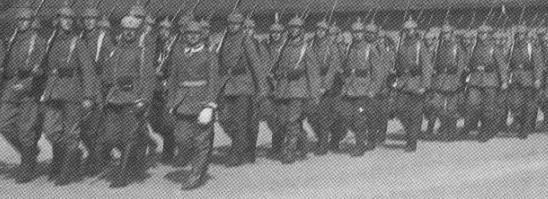
1914 Various:
List Regiment (Sep 1-Oct 7): Infantry Recruit Adolf Hitler's regiment begins a short but intensive basic training program, which is held in the premises of a large public school on the Elizabeth Platz in Munich. Hitler receives the first uniform of his life; basic greenish-grey with an "RIR 16" sown in red unto the epaulettes and a red stripe down the side of the trousers. The trousers are tucked into new leather boots, topped by a thick leather belt around the waist of the uniform jacket. [For further details, Click here.]
First Battle of the Marne: Assuming the BEF is no longer a threat, Kluck shifts westward, widening the existing gap between his army and that of Bulow, which is still advancing to the south. Exploiting this gap, French commander Franchet d'Esperey (above), in a vigorous night attack, takes Marchais-en-Brie from the Germans. This is probably the turning point of the battle. Bulow, personally defeated, is about to retreat. Kluck's First Army is making headway in the northwest against Maunoury's left, but the BEF's northward advance into the gap threatens Kluck's left and rear. Moltke, realizing that his offensive has failed, then orders a retreat to the Noyon-Verdun line. Note: Allied losses are about 250,000; German casualties nearly 300,000.
General Joffre's Proclamation to the Sixth Army:

The 6th army has just sustained, during five entire days, without interruption or rest, an engagement against a numerous enemy whose previous successes had raised their morale to a high pitch. The struggle has been a severe one, and the losses from fire, as well as from fatigue due to want of sleep, and occasionally of provisions, have surpassed any that have been hitherto imagined; you have supported all this with a valour, a firmness, and an endurance to which no words can possibly give adequate expression. Comrades! Your General asked you, for the sake of your country, to do more than your plain duty; your answer has exceeded his most sanguine expectations. Thanks to you, victory has crowned our colours. Now that you have realized the glorious satisfaction of victory, you will in future never let it fall from your grasp. As for myself, if I have been able to help I have been fully compensated by the greatest honour of my long career, namely, to have commanded troops such as you are. For all you have done I thank you with sincerest emotion, because to you I owe that to which all my efforts and energy for the last forty-four years have been directed - Revenge for 1870! My thanks to you; honor to all the combatants of the 6th army.
Defeat at Ourcq River: Announcement by German Army Chief of Staff Helmuth von Moltke:

East of Paris [German] detachments which had advanced to the Marne and across it have been attacked by superior enemy forces coming from Paris, and between Meaux and Montmirail. These detachments held the enemy, and after hard fighting, which lasted two days, they have gained ground. News having been received as to the approach of new and strong enemy columns, the [right] wing of these detachments has fallen back without being anywhere pursued.

1915 World War I: List Regiment : Gefreiter Adolf Hitler's 16 Reserve Infantry Regiment continue to occupy a position at Fromelles—pictured above in a drawing by Hitler—on a level field with water channels, willow trees and willow stalks; in the distance towards the enemy lines lies an insignificant wood with barbed wire entanglements. Under the direction of their defense-minded commander, Lieutenant General Gustav Scanzoni von Lichtenfels, the regiment works ceaselessly day and night to further fortify their position at Fromelles while fighting off repeated assaults by the enemy. [For further details, Click here.]
1916 World War I: Balkans: French General Maurice Sarrail, technically in command, launches an abortive counteroffensive while bickering with his British subordinates.
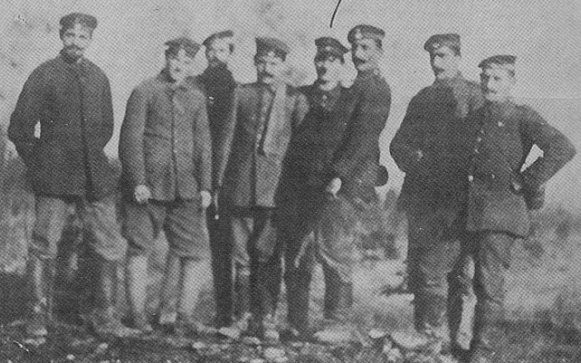
Hitler and his fellow dispatch runners
1916 World War I: Gefreiter Adolf Hitler endures trench warfare in Flanders (Artois) with 3 Company, 16 Reserve Infantry Regiment [List Regiment]. [For further details, Click here.]

1917 World War I (September 8-11): The List Regiment is taken off the front by train for a two month rest.
[For further details, Click here.]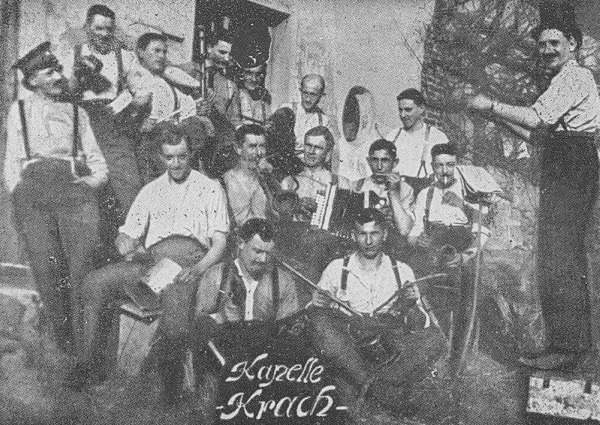
1918 World War I (August 21-September 27): Gefreiter Adolf Hitler attends a signals training course in Nuremberg. [For further details, Click here.]
1919 Various:
Representatives of the now tiny republic of Austria sign the Treaty of Saint-Germain: The once great Habsburg empire had completely disintegrated in October and November 1918. Austria recognizes the independence of Czechoslovakia, Poland, Yugoslavia, and Hungary; it also recognizes the award of Galicia to Poland, and of the Trentino, South Tyrol, Trieste, and Istria to Italy. Note: Austria is explicitly forbidden to unite with Germany, as many in both countries had envisioned.
[See: Austria: The Other Germany.]New York City parade honors U.S. soldiers from World War I:
On this day in 1919, almost one year after an armistice officially ended the First World War, New York City holds a parade to welcome home General John J. Pershing, commander in chief of the American Expeditionary Force (AEF), and some 25,000 soldiers who had served in the AEF's 1st Division on the Western Front. [For further details, Click here]
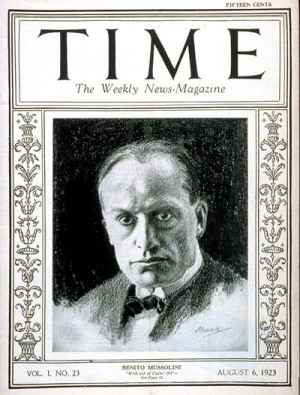
1923 Balkans: In response to a dispute with Yugoslavia, Mussolini mobilizes Italian troops on the Serbian border.
1925 Rise of Nazism:The North-West German Gauleiters' Working Group of the NSDAP is established. (Maser)
1926 Weimar: Germany enters the League of Nations. (THP)
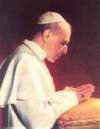
1933 Church and Reich: The Concordat becomes final when documents of ratification are exchanged between Cardinal Pacelli and German Chargé d'Affaires Eugen Klee. (THP)
1937 Spanish Civil War: Opening of the conference at Nyon dealing with issues created by the war.
1939 World War II: Various:
Canada declares war on Germany:
The people of Canada will, I know, face the days of stress and strain [that] lies ahead with calm resolute and courage. There is no home in Canada, no family, and no individual whose fortunes and freedom are not bound up in the present struggle. I appeal to my fellow Canadians to unite in a national effort to save from destruction all that makes [life] itself worth living.
German Ambassador in the Soviet Union (Schulenburg) to the German Foreign Office:
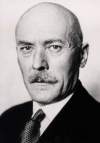
Supplementing my telegram No. 310 of September 9 and with reference to telephone conversation of today with the Reich Foreign Minister. In today's conference at 4 p. m. Molotov modified his statement of yesterday by saying that the Soviet Government was taken completely by surprise by the unexpectedly rapid German military successes. In accordance with our first communication, the Red Army had counted on several weeks, which had now shrunk to a few days. The Soviet military authorities were therefore in a difficult situation, since, in view of conditions here, they required possibly two to three weeks more for their preparations. Over three million men were already mobilized. I explained emphatically to Molotov how crucial speedy action of the Red Army was at this juncture.
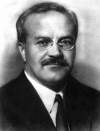
Molotov repeated that everything possible was being done to expedite matters. I got the impression that Molotov promised more yesterday than the Red Army can live up to. Then Molotov came to the political side of the matter and stated that the Soviet Government had intended to take the occasion of the further advance of German troops to declare that Poland was falling apart and that it was necessary for the Soviet Union, in consequence, to come to the aid of the Ukrainians and the White Russians "threatened" by Germany. This argument was to make the intervention of the Soviet Union plausible to the masses and at the same time avoid giving the Soviet Union the appearance of an aggressor. This course was blocked for the Soviet Government by a DNB report yesterday to the effect that, in accordance with a statement by Colonel General Brauchitsch, military action was no longer necessary on the German eastern border. The report created the impression that a German-Polish armistice was imminent. If, however Germany concluded an armistice, the Soviet Union could not start a "new war." I stated that I was unacquainted with this report, which was not in accordance with the facts. I would make inquiries at once.
Poland: German troops achieve a breakthrough at Kutno and Sandomir and reach the Vistula.
War at Sea: The submarine HMS Oxley, after failing to return a recognition signal, is sunk by the submarine HMS Triton off the coast of Norway, and becomes the Royal Navy's first loss.
1940 World War II: War in the air:
British War Cabinet reacts to the Blitz in kind:
The prior two nights of bombing had wrought extraordinary damage, especially in the London slum area, the East End. King George VI even visited the devastated area to reassure the inhabitants that their fellow countrymen were with them in heart and mind. Each night since the seventh, sirens had sounded to announce the approach of incoming German planes, which had begun dropping bombs indiscriminately in the London vicinity, even though the docks had been their primary target on Day One of the Blitz. As British bombers set out for Germany to retaliate, they were instructed not to return home with their bombs if they failed to locate their original targets. Instead, they were to release their loads where and when they could.
On the night of the 10th, a night when British Home Intelligence had been alerted of how panicked Londoners were becoming at the sound of those air-raid sirens, Berlin was paid in kind, with a cascade of British bombs-one of which even landed in the garden of Joseph Goebbels, the Nazi Party's minister of propaganda. (History.com)
Buckingham Palace is hit by a German bomb.
1941 World War II: War at Sea: British convoy SC42 is attacked by a wolf pack of German U-boats off Greenland. They sink 18 ships, with the loss of two submarines,U-207 and U-510.
1942 World War II: Various
Failure of Soviet forces attacking from besieged Leningrad to break the German lines:
Less than two and a half months after the Soviet Union was attacked by Nazi Germany, German troops were already approaching Leningrad. The Red Army was outflanked and on September 8 1941 the Germans had fully encircled Leningrad and the siege began. The siege lasted for a total of 900 days, from September 8 1941 until January 27 1944. The city's almost 3 million civilians (including about 400,000 children) refused to surrender and endured rapidly increasing hardships in the encircled city. Food and fuel stocks were limited to a mere 1-2 month supply, public transport was not operational and by the winter of 1941-42 there was no heating, no water supply, almost no electricity and very little food.
War in the Air: The Royal Air Force uses 476 planes to drop 100,000 bombs on Duesseldorf in a single raid:
Area bombing of city centres was achieving far more visible results than bombing of industrial targets. The synthetic oil refinery at Gelsenkirchen was bombed twice, but was back in production within weeks; by contrast, a single raid on Duesseldorf left 140,000 people homeless. However, German air defences were increasing in efficiency; Bomber Command lost 1,000 aircraft during the campaign. Harris was forced to switch targets and send out diversionary raids, limiting the devastation caused by each raid.
Madagascar: The British carry out an amphibious landing at Majunga, north-west Madagascar, to re-launch Allied offensive operations in the Madagascar Campaign.
India:

Churchill: Large reinforcements have reached India and that the numbers of white soldiers now in that country, though very small compared with its size and population, are larger than at any time in the British connection. I, therefore, feel entitled to report to the House that the situation in India at this moment gives no occasion for undue despondency or alarm.
USA: Gasoline rationing as part of the US wartime effort:
Almost overnight the economy shifted to war production. Consumer goods took a back seat to military production as rationing began almost immediately. It was truly a total war affecting every citizen whether soldier or worker, mother or child. Rubber became the first commodity rationed as the Japanese invasion of the Dutch East Indies cut off our supply. Gasoline rationing reduced the number of miles the average citizen drove and thus conserved rubber. Voluntary gas rationing proved ineffective and by the Spring of 1942, seventeen Eastern states had instituted some form of mandatory gas rationing. By December mandatory controls extended across the entire country. On average, motorists who used their cars for "nonessential" purposes were restricted to 3 gallons of gas a week.
Holocaust: 533 Jews are deported from Nuremberg to the camp at Theresienstadt. Only 27 will survive the war. (THP)
The first name that the Nazis gave to the garrison town, which had been renamed Terezin by the Czechs, was Theresienbad, which means Spa Theresien, implying that it was a spa town where people could take mineral baths. Then the name was changed to Reichsaltersheim, or State Old People's Home. Some of the unsuspecting elderly Jews in Germany actually paid for an apartment in the ghetto and signed contracts for housing, food, and medical treatment which was to be provided. They were very disappointed when they got to Theresienstadt and learned that it was nothing like the spa town or old folks' home that they were expecting and that they were not going to have luxury accommodations, even though they had paid. Since they were too old to work, their rations were less than the amount given to the workers, and their mortality rate was extremely high.
1943 World War II: Various:

FDR and Churchill to Stalin:
We are pleased to tell you that General Eisenhower has accepted the unconditional surrender of Italy, terms of which were approved by the Unites States, the Soviet Republics, and the United Kingdom. Allied troops have landed near Naples and are now in contact with German forces. Allied troops are also making good progress in the southern end of the Italian peninsula.
Italy: One day after Italy surrenders to the Allies, German forces occupy Rome and the strategic northern passes.
Black Sea: Soviet marines supported by naval units of the Red Fleet recapture the Black Sea port of Novorossisk.
1944 World War II: Various:
Poland: General Kazimierz Sosnkowski: The Supreme Commander of the Polish troops fighting on the Western Front tells his soldiers that "Poland entered the war four years earlier because of the urging of Great Britain." At Churchill's insistence, General Sosnkowski is relieved of his command. (THP)
The Germans leave Istanbul: Baron Sebottendorff, founder of the Thule Society, who has been working for German Intelligence, is given funds to support himself for a year. (THP)
Holocaust: Slovakia: The deportation of Jews is renewed. (THP)
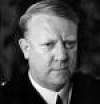
1945 Vidkun Quisling: 'Puppet' Premier of Norway, is sentenced to death in Norway for his collaboration with Nazi Germany after the 1940 invasion. Note: Quisling was the founder of Norway's National Party in 1934, which was an imitation of Hitler's National Socialist Party. (See Oct 24)
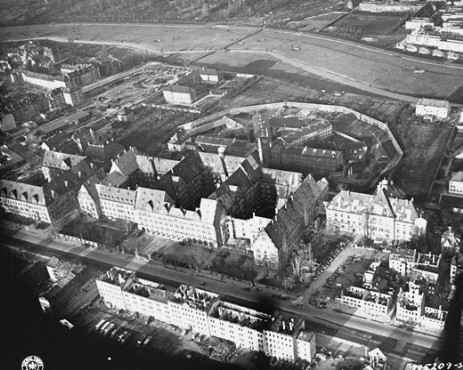
1946 Nuremberg Tribunal: The justices meet to discuss verdicts in the Major War Criminals Trial. (See: 30 September 1946)
1948 Mildred "Axis Sally" Gillars: Nazi radio propagandist during World War II, is indicted for treason in Washington, DC. She will ultimately be convicted and spend 12 years in prison.
1981 Guernica returned to Spain:
Spanish artist Pablo Picasso's monumental anti-war mural Guernica is received by Spain after four decades of refugee existence. One of Picasso's most important works, the painting was inspired by the destruction of the Basque town of Guernica by the Nazi air force during the Spanish Civil War. In 1939, Picasso gave the painting to New York's Museum of Modern Art on an extended loan and decreed that it not be returned to Spain until democratic liberties were restored in the country. Its eventual return to Spain in 1981—eight years after Picasso's death—was celebrated as a moral endorsement of Spain's young democracy.
1989 Hungary allows East Germans refugees to leave:
In a dramatic break with the eastern European communist bloc, Hungary gives permission for thousands of East German refugees to leave Hungary for West Germany. It was the first time one of the Warsaw Pact nations-who were joined in the defensive alliance between Russia and its eastern Europe satellites—broke from the practice of blocking citizens of the communist nations from going to the West.
[For further details, Click here]
Edited by Levi Bookin (Copy editor)
levi.bookin@gmail.com



Click to join 3rdReichStudies



Disclaimer: This site includes diverse and controversial materials—such as excerpts from the writings of racists and anti-Semites—so that its readers can learn the nature and extent of hate and anti-Semitic discourse. It is our sincere belief that only the informed citizen can prevail over the ignorance of Racialist "thought." Far from approving these writings, this site condemns racism in all of its forms and manifestations.
Fair Use Notice: This site may contain copyrighted material the use of which has not always been specifically authorized by the copyright owner. We are making such material available in our efforts to advance understanding of historical, political, human rights, economic, democracy, scientific, environmental, and social justice issues, etc. We believe this constitutes a "fair use" of any such copyrighted material as provided for in section 107 of the US Copyright Law. In accordance with Title 17 U.S.C. Section 107, the material on this site is distributed without profit to those who have expressed a prior interest in receiving the included information for research and educational purposes. If you wish to use copyrighted material from this site for purposes of your own that go beyond 'fair use', you must obtain permission from the copyright owner.
Please Note: The list-owner and moderators of 3rdReichStudies are not responsible for, and do not necessarily approve of, the random ads placed on our pages by our web server. They are, unfortunately, the price one pays for a 'free' website.